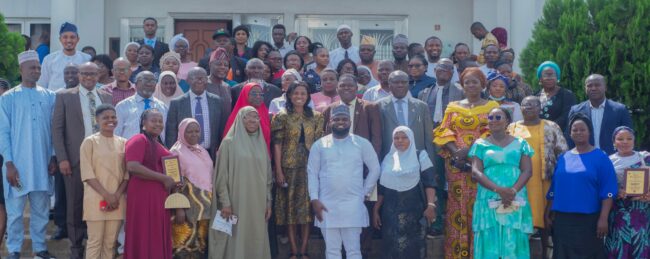The Oyo State government, in partnership with Accelerating Nutrition Results in Nigeria (ANRiN) and Solina Health, has reiterated its commitment to fighting malnutrition among children, adolescent girls, and pregnant women in the state.
The partners made this known during a stakeholders’ meeting on Wednesday in Ibadan tagged ‘Solina Health end-of-ANRiN Project Oyo State stakeholders dissemination and close-out meeting’.
According to the organisers, 242 community volunteers and 16 supervisors worked on the ANRiN project for Solina Health, and the 16 local governments in the state where Solina Health worked were: Ibadan South West, Ibadan North West, Ibadan North East, Ido, Akinyele, Oluyole, Iseyin, Kajola, Ibarapa North, Ibarapa East, Ibarapa Central, Iwajowa, Atisbo, Itesiwaju, Saki East, and Saki West.
The project coordinator of ANRiN in the state, Dr Khadijah Alarape, while delivering the opening remarks, noted that ANRiN is a government-led, World Bank-funded project aimed at the utilisation of quality and cost-effective nutrition services for pregnant and lactating women, adolescent girls, and children under five years of age.
After describing the ways the project was carried out in the state and the type of supplements given to the beneficiaries, Alarape appreciated the state and non-state actors involved in the project for making it a success, seizing the opportunity to seek ways to improve on what they have collectively achieved in the last three years.
The Oyo State Commissioner for Health, Dr Oluwaserimi Ajetunmobi, expressed satisfaction that the 36-month project ended well. She revealed that during the project, she was in the field to see things for herself and was impressed with the results.
“We have seen that when we come together, we achieve more. However, in the future, it is our responsibility to make sure the gains and indices of the project are sustained and improved on in the future,” the commissioner said.
The commissioner stressed that to sustain the gains of the project cost-effectively, collaboration, agreement, setting realistic goals, taking ownership of the results, and educating and counselling children and women on the best ways to manage their nutritional needs are needed.
The project manager and principal of Solina Health, Mr Demilade Osoteku, stated that their work involves partnering with the government, donors, and the private sector to accelerate health impact.
He added that the organisation implemented the ANRiN across five states in the country ─ Oyo, Abia, Gombe, Plateau, and Kwara states.
Osoteku stated that between April 2021 and June 2024, they worked closely with the Oyo State government and community-based organisations to provide four million services to women, adolescent girls, and children across the state, adding, “All of these numbers are verifiable.”
The deputy project director of Solina Health in Oyo State, Dr Omowumi Okedare, presented an overview of the project’s background, aims, goals, and achievements, as well as the challenges faced, strategies deployed, and lessons learned.
Okedare stated that they adopted a mix of counselling and service delivery approaches to promote increased access to and utilisation of key services, adding, “Solina Health team has provided 4,288,898 basic packages of nutrition services in the state, of which 1,613,999 are repeat services.”
According to her, the supplements, as given to the beneficiaries, were as follows: children ─ Zinc/ORS, Vitamin A, Albendazole and Micronutrient Powder (MNP); pregnant women ─ iron folic acid (IFA), Intermittent Preventive Treatment in Pregnancy (IPTp); and lactating mothers, infants, and young children nutrition counselling (MIYCN).
Okedare added that children and pregnant women received commodity-based services while lactating women only received counselling on exclusive breastfeeding and infant care.
The procurement and logistics manager of Solina Health, David Akinola, spoke on the possible ways the project can be sustained. He stated that the four ways they have identified to sustain the ANRiN project are through public-private partnership, community ownership and engagement, integrating the project into the health system, and government counterpart funding.
Other stakeholders and participants at the event, including nutrition vocal persons, health educators, medical officers, and project coordinators from the 16 benefiting local governments, also suggested ways the project can be sustained for the betterment of children, women, and the government of the state.
Other State stakeholders at the event included Dr Akintunde Ayinde, Permanent Secretary of the Oyo State Ministry of Health; Dr Anifat Ibraham, Permanent Secretary, Oyo State Hospital Management Board; Dr Akintunde Babatunde, Oyo State Director of Public Health; Dr Sunday Ojelabi, Permanent Secretary of the Oyo State Ministry of Budget and Planning; Dr Johnson Osoko, Director of Disease Control; and Dr Abbas Gbolahan, Director of Research, Planning, and Statistics, Oyo State Ministry of Health.
Others were local government nutrition focal persons, health educators, and medical officers of Health/PHC coordinators from the 16 benefiting LGAs.
ALSO READ THESE TOP STORIES FROM NIGERIAN TRIBUNE
